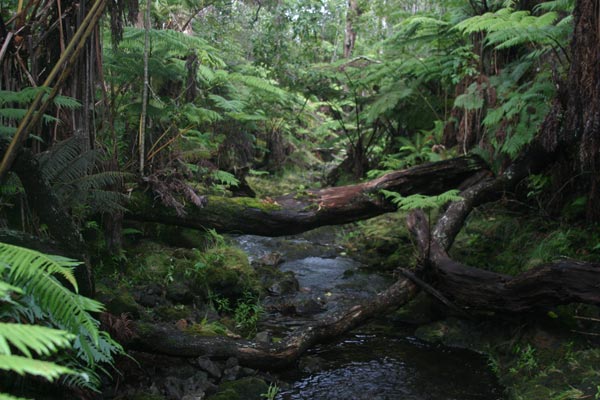Study helps assess impact of temperature on belowground soil decomposition

The research, led by U.S. Forest Service Research Ecologist Dr. Christian Giardina, with the agency’s Institute of Pacific Islands Forestry, Pacific Southwest Research Station, with co-authors Drs. Creighton Litton and Susan Crow (University of Hawai`i at Manoa), and Dr. Greg Asner (Carnegie Institution for Science), shows that soil carbon storage was constant across a highly constrained 5 degrees Celsius gradient of mean annual temperature in tropical montane wet forest in Hawai`i.
The scientists also showed an increase in productivity across the gradient, both above and belowground, and an increase in the decomposition rate of fresh litter and a decline in coarse woody debris with warming. From these results, they concluded that long-term warming in tropical montane forests will accelerate carbon cycling, but is unlikely to cause net losses of soil carbon.
“Given our findings, we expect that warming alone, that is in the absence of other changes such as drying or increased fire, will not accelerate the loss of carbon from mineral soils,” says Giardina. “This means that tropical soils will not become a net source of CO2 to the atmosphere.”
The effects of warming on soil carbon storage are poorly quantified because it is difficult to assess how temperature change impacts processes below the soil surface. However, the temperature gradient used in this study provides an ideal study system for measuring ecosystem responses to warming over long periods of time. The scientists were careful to find a gradient of temperature change where potentially confounding factors were held constant, including vegetation composition, disturbance history, geology, and soil type and moisture. This allowed them to isolate the effects of changing temperature on ecosystem carbon storage and flux.
The scientists propose that where ecosystem carbon is unprotected, such as at the surface in plant debris, its decomposition and storage will respond strongly to warming. However, when carbon is protected in the soil, decomposer organisms have reduced access to that carbon and so decomposition or storage show little temperature sensitivity. And while climate warming will continue with the addition of greenhouse gases into the atmosphere due to human activities (fossil fuel combustion, land-use clearing), previous assumptions about a positive soil carbon cycling feedback to future warming may be incorrect.
While soil carbon storage and turnover was insensitive to warming, the decomposition of coarse wood and plant growth did increase, which means that the capacity of tropical ecosystems to retain carbon will depend on the balance of changes within each ecosystem.
To read the paper: http://www.treesearch.fs.fed.us/pubs/46423
Headquartered in Albany, Calif., the Pacific Southwest Research Station develops and communicates science needed to sustain forest ecosystems and other benefits to society. It has research facilities in California, Hawaii and the U.S.–affiliated Pacific Islands. For more information, visit www.fs.fed.us/psw/.
Media Contact
More Information:
http://www.fs.fed.us/psw/news/2014/20140923_soil_decomposition.shtmlAll latest news from the category: Agricultural and Forestry Science
Newest articles

Making diamonds at ambient pressure
Scientists develop novel liquid metal alloy system to synthesize diamond under moderate conditions. Did you know that 99% of synthetic diamonds are currently produced using high-pressure and high-temperature (HPHT) methods?[2]…

Eruption of mega-magnetic star lights up nearby galaxy
Thanks to ESA satellites, an international team including UNIGE researchers has detected a giant eruption coming from a magnetar, an extremely magnetic neutron star. While ESA’s satellite INTEGRAL was observing…

Solving the riddle of the sphingolipids in coronary artery disease
Weill Cornell Medicine investigators have uncovered a way to unleash in blood vessels the protective effects of a type of fat-related molecule known as a sphingolipid, suggesting a promising new…





















